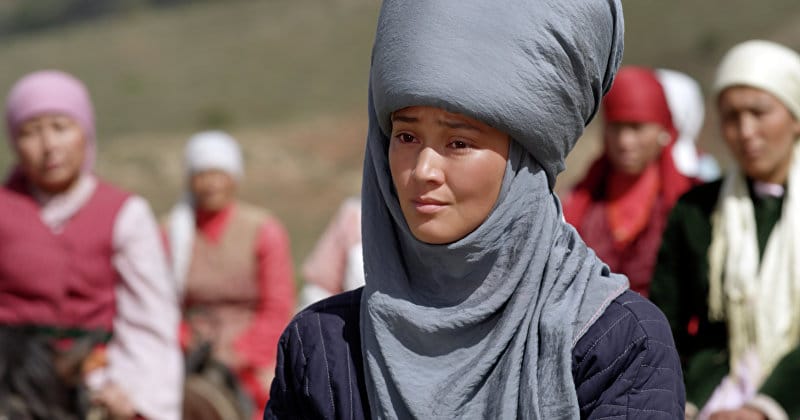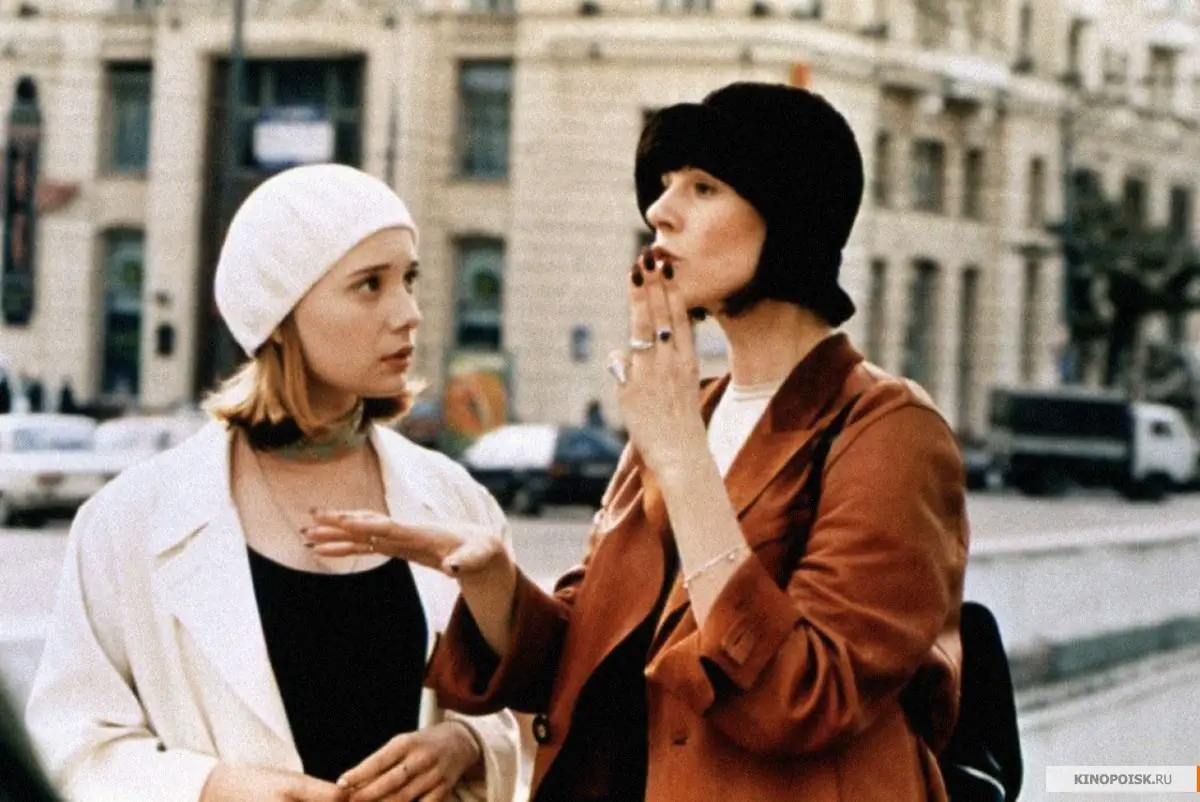Country of the Deaf (known as Страна глухих in Russian) is a 1998 crime film based on Renata Litvinova’s novel To Own and Belong (Обладать и принадлежать in Russian). The film sits in the top 20 Russian films of the 90s according to KinoPoisk and depicts an alternate Moscow set in the early 1990s that possesses an atmosphere and moodiness that captivates audiences and critics alike.
The movie was directed by Valery Todorovsky and produced by Gorky Film Studio, a studio that has produced many of the classic films during the Soviet era. The film has received multiple awards and nominations. Country of the Deaf won two Nika Awards for Best Female Actor (Dina Korzun) and Best Sound Design (Gleb Kravetsky). It also won several Russian Guild of Film Critics Awards in the categories of Best Film, Best Female Actor (Dina Korzun), Best Supporting Actor (Maksim Sukhanov) and Best Music (Alexey Aygi). Country of the Deaf is critically acclaimed with a rating of 7.6/10 on Russia’s KinoPoisk and a 7.5/10 on IMDB.
Country of the Deaf is currently available on Soviet Movies Online with both Russian and English subtitles.
Synopsis of Country of the Deaf
The beginning of Country of the Deaf centers on a young woman named Rita (Chulpan Khamatova) who is on the run from the mafia in Moscow. Her boyfriend Alyosha (Nikita Tyunin) has been taken by them for his gambling debts. Prior to the film’s start, Rita had helped Alyosha earn back enough money to pay his debts to the mafia crime lord, but Alyosha soon gambles it away again and Rita is in danger. In the first few minutes of the film, Rita manages to hide and is rescued by Yaya (Dina Korzun), a deaf dancer who works in the nightclub where Rita last saw Alyosha.
Leaving their previous lives in the past, Yaya and Rita hide in a vacant sculpting studio and begin to think of ways that they can start making money. Rita quickly learns that Yaya is obsessed with one thing, to save enough to go to an imaginary place called the Country of the Deaf where there is no use for money or material possessions.
The pair become close friends, despite Yaya’s need for attention and pathological lying. Eventually, Yaya finds Rita a job working for The Pig, a mafia leader whose crime ring is entirely composed of deaf people. The Pig likes Rita and wants her to pretend to be deaf so that she can eavesdrop on his business deals and alert him when there is danger with the other mafias.
Tension arises when Rita, having saved enough money to rescue Alyosha, loses interest in Yaya and her Country of the Deaf. Yaya becomes jealous and the two separate. Their argument is soon overshadowed by an emerging rivalry between the Pig’s gang and Alyosha’s captors. By the end of the movie, tensions are high; Rita finds herself caught between repaying debts, a turbulent friendship with Yaya, and the dangers of mafia life. How will she make it out alive?
Viewing Страна глухих as an Intermediate Russian Language Learner
Country of the Deaf is both a Russian and sign language film, so it may be challenging to understand the plot as it switches between the two forms of communication. Fortunately, Dina Korzun’s critically acclaimed performance eases the language comprehension process through her vivid expressions and acting. However, there are some Russian words and phrases that are valuable to learn before watching the film.
Helpful Words
- деньги (money)
- глухой (deaf)
- немой (mute)
- как море (like the sea)
- выгнать (to kick out)
- уши (ears)
- совсем (completely)
- обманывать (to trick, deceive)
- зачем (syn. почему)
- проститутка (prostitute)
- остров (island)
- прятать (to hide)
- ненавидеть (to hate)
- опасность (danger)
As you watch, try to identify the above words as they are spoken throughout the film. It may be difficult to understand the movie due to the characters’ accents and the lack of English subtitles. Nonetheless, with context clues and prior knowledge, you will be surprised by how much Russian you will be able to understand! Watching the film a second time may be beneficial as you can focus more intensely on the dialog without worrying about the plot.
Analysis of the Film
Actors in Country of the Deaf have received acclaim for their performances, especially Chulpan Khamatova and Dina Korzun, who both made their screen debuts and breakthrough performances in this film. The chemistry between Khamatova and Burkovskiy provides a feminist undertone to the film. Rita and Yaya, both previously wronged by the reckless men in their lives, decide to turn the tables and make money off men.
According to Soviet Movies Online, Yaya’s longing for the Country of the Deaf can be viewed as an allegory for life in the former Soviet republics following the fall of the Soviet Union. The movie possesses themes of escapism, choices, and disheartenment. Early in the film, Yaya loses her job, and is kicked out of her apartment by her likewise deaf landlords who steal her shoes. Yaya is left on her own to make a living and create the life full of happiness that she has always wanted.
The musical scoring of Alexey Aygi is surprisingly uplifting and gives the film a hopeful tone, despite the violence and trouble between which the two women have found themselves trapped. Additionally, the sound design by Gleb Kravetsky is vital to the film’s success as a sign language film. The audio mixing places equal importance between the spoken dialogue, footsteps, and audible sounds made by the deaf characters who do not speak aloud. Kravetsky succeeds in constructing a distinct vivid atmosphere unique to the film, while also illuminating the unseen world of Deaf individuals in Moscow.
Watch Country of the Deaf Online
Watch the full movie on Soviet Movies Online.
Watch the movie trailer below.
You Might Also Like

Films of Eldar Ryazanov, Moral Voice of the USSR
Eldar Ryazanov is remembered as one of the most influential and beloved directors in the post-Stalin Soviet era. Phrases from his movies, which is often co-wrote are still quoted by Russians as much as pieces of folk wisdom as pop culture references. He is best known for light comedies that also delivered social reflection, moral […]

Repentance: A Georgian Film and a Warning To The World
In 1984, the Georgian director Tengiz Abuladze made a film called Repentance. It was quickly banned for its truly daring allegorical depiction of Stalin’s terror and how future generations of leaders suppress the truth of the crimes of their ancestors. However, Gorbachev’s glasnost policies unearthed the film and allowed for its domestic and international release […]

Kurmanjan Datka: American Students Review a Modern Kyrgyz Film
Kurmanjan Datka is a historical drama about a woman who helped unite Kyrgyzstan’s fourty tribes into a nation to fight the invading Russian forces. Recently, a modern film was made of her life and deeds. It is called simply Kurmanjan Datka, although it was released with English subtitles with a second name: Queen of the […]

Chernukha: Russia’s Tough Truths Through The Filmmaker’s Lens
Glasnost’ (Гласность), a political and social policy spearheaded by Soviet leader Mikhail Gorbachev (Михаил Горбачёв) in the USSR in the late 1980s, described an increased ability of Soviet citizens to openly discuss problems in their country. Glasnost’ affected nearly all aspects of society, including filmmaking. Filmmakers of the late Soviet period used their newfound freedom […]

The Hunter (2011): Learning Russian Through Film
The Hunter (2011; Охотник), directed by Bakur Bakuradze, is a film of few words. Starring Mikhail Barskovich, Tatyana Shapolova, and Gera Avdochenok, the film employs lesser-known actors in the creation of this deeply moving picture. The film was critically well received and was nominated for the UN Certain Regard Award at the 2011 Cannes Film […]











